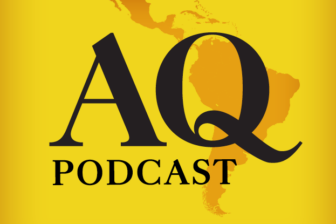This article is adapted from AQ’s special report on fighting the effects of the COVID-19 pandemic. See all 5 Big Ideas for recovery here:
Guarantee Income | A New Trade Push | Universal Health Care
Not Just GDP | Keep Kids in School
Even before the coronavirus crisis hit, decades-long declines in Latin American poverty rates had begun to slow. After an impressive reduction from around 40% at the turn of the century to less than 30% by 2012, those figures stagnated and, in some countries, increased slightly by the end of the last decade.
Due to COVID, there is a strong risk that this slowdown will become an outright reversal — and that decades of progress in reducing poverty and inequality could be completely wiped out.
Download our 5 Big Ideas special report as a PDF
To stop that from happening, Latin American governments need to support the millions of people who have seen their incomes erased overnight, those families at the margins of the middle class who are one health issue or job loss away from falling back below the poverty line.
The best way to do this is with guaranteed income: a regular stipend for those in society who are most in need. This is not the same as a universal basic income, or UBI, which has its share of advocates in the region. Given Latin America’s current fiscal state, a truly universal income is, for now, a bridge too far — the money just isn’t there. Any ubi proposal would also create a messy, time-consuming political debate about distributive justice precisely when urgent action is direly needed.
Guaranteed income is thus a more viable and arguably just as effective policy to pursue — but it won’t be easy either.
The goal for governments in the region should be to institute programs that will complement the income of low earners in the formal and informal sectors, and that can replace income for the unemployed. An ambitious guaranteed income program would thus reach about 65% of Latin America’s population — the 30% of the region already below the poverty line, and the 35% considered at high risk of ending up there. In both cases, the ultimate aim would be to keep people out of poverty and able to pay for basic needs.
While the region is not yet in a fiscal position to make this type of scheme a reality, there is a way to get there with a smart combination of reform and persuasion — one that could simultaneously appeal to business, iron out inefficiencies in social spending, and protect the region’s most vulnerable. Here’s a roadmap.
Step one: build on existing foundations
Governments across Latin America have created or expanded social programs in response to the pandemic, with varying degrees of success. Governments have assigned between 1% and 7% of GDP to these programs in an effort to alleviate the consequences of economic shutdown and help people comply with health restrictions and lockdowns. Without these programs in Colombia, for example, we estimate more than 2.5 million people would have fallen under the poverty line. Such programs are also the reason why poverty in Brazil actually fell in the first weeks of the pandemic, rather than increase.
Governments have done this in record time, gathering the necessary data and implementing programs with a speed and degree of efficiency that shows that true safety nets can indeed be built by governments in the region. In designing programs that reach everyone in need — filling holes left in earlier social programs by informality and limited state capacity — the region no longer needs to reinvent the wheel. The logistical basis for near-universal support has already been laid.
Step two: expand the tax base
Simply making these programs permanent is currently unattainable from a fiscal point of view. The average level of tax revenue as a portion of annual GDP in Latin America was 22.8% in 2018, well below the OECD average of 34.2%. Many countries, including Mexico and Peru, fare even worse.
A guaranteed basic income is thus conceivable only if it comes alongside an increase in fiscal revenues. This in turn would require a series of multifaceted reforms that will only be successful if implemented simultaneously.
The first of these would be to establish a universal income declaration. That is, all adults would have to file with a national tax collection administration, regardless of their source of income, whether or not they are employed, or if they work in the formal or informal sector. This would include people with no income at all.
A guaranteed basic income is only conceivable if it comes alongside an increase in fiscal revenues.
The first of these would be to establish a universal income declaration. That is, all adults would have to file with a national tax collection administration, regardless of their source of income, whether or not they are employed, or if they work in the formal or informal sector. This would include people with no income at all.
This type of universal declaration is not currently mandatory in the region, but would be essential in identifying who needs aid.National tax agencies would have to be given sufficient authority and tools to guarantee that these declarations are presented effectively, and that the figures represented can be trusted.
There are examples from which the region can draw inspiration. The universal declaration of income is common in developed countries as a means of simplifying tax administration, but also as a mechanism to efficiently direct government aid. Tax collection would have to increase in other ways, too, to be large enough to sustain any income guarantee program. This would vary by country — but require a combination of an increase in income tax rates, especially on capital, fewer tax exemptions, and strong oversight capacity for tax administration bodies.
Step three: use the minimum wage to reduce informality
Universal declarations could certainly help expand the size of the tax base. But to realize their potential, those paying taxes would need to be employed and receiving decent, registered income — something that can’t be accomplished at current levels of informality.
The good news is that a guaranteed minimum income could partially replace and improve the instrument that to this point has sought to ensure — without much success — a basic living standard throughout the region: the minimum wage.
Minimum wage levels in some countries in Latin America are higher than the median income level, producing distortions in the labor market and hindering efforts to reduce informality. (If a micro or small business can’t afford to pay the employees it needs at the minimum wage, it is more likely to keep itself off the government’s books.)
The final piece of the puzzle would thus be for government transfers to complement workers’ salaries. People without any income would receive the full transfer amount, while low-income employees would receive a reduced sum depending on their existing earnings. Transfers for employees would be large enough to ensure that their final income exceeds the basic guarantee. This would encourage employment, reduce incentives for informality and help garner private sector support for the initiative.
Step four: sell it
Of course, there are objections to a comprehensive reform such as the one described. First, some argue that a guaranteed income might discourage jobless people from actively searching for employment. But the available evidence suggests this is not the case. The most recent and maybe most reliable experiment on basic income, implemented in Finland, actually showed an increase in the labor participation of basic income recipients. The reason seems to be that this type of cash transfer leads to greater employability and higher quality jobs, because it allows people the time and economic security to search for employment more thoroughly to find a better fit.
Another objection is that even though the long-term positive effects of a reduction in informality and inequality are desirable goals, a tax reform in the middle of a deep crisis may hamper economic recovery. That is a fair concern. However, the necessary increase in taxes could be adopted now but be prorated, with effective collection beginning in two years or so. This would take advantage of the political will generated by the crisis without compromising other recovery efforts.
A reform such as the one described would have huge benefits that significantly outweigh concerns, both structurally and for long-term recovery from the COVID-19 crisis. First and foremost, it would be a massive step toward protecting vulnerable populations. It would also lead to progress in the fight against informality to a degree that would be difficult to achieve through other types of reform.
The flexibility of the minimum wage would also be particularly useful given the current conditions faced by businesses, in which the possibility of a recovery would be threatened by any reluctance among employers to create new jobs that could tie them to high costs.
Amid such an unprecedented crisis the potential to implement radical reforms may seem limited. But a political consensus may be more easily reached today than in the recent past. And if done right, a guaranteed income could rally a wide stretch of the political spectrum. It may help make reductions in poverty more sustainable. But it could also help consolidate the accumulation of higher quality human capital, feeding a virtuous cycle of increased productivity and sustained economic growth.
—
Eslava is a professor and dean of economics at the Universidad de los Andes and a research affiliate of LACEA and the IPA’s SME program. Zambrano is an associate professor of economics at the Universidad de los Andes. Álvarez is an associate professor and director of the economics Ph.D. program at the Universidad de los Andes.






